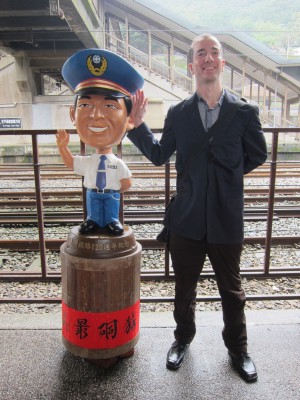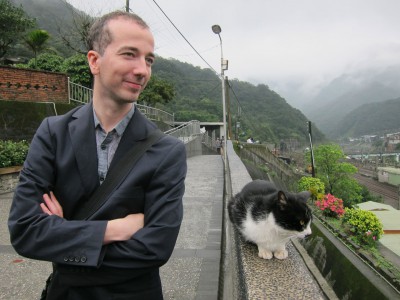I arrived in Taiwan, I had a place to stay and I had an e-mail in my inbox offering me work. I was off to a start on this working holiday.
The e-mail came from one of the language institutes I applied to, they specialize in European languages, one of them being German. I had zero experience in actual classroom teaching, but I was honest with this on my resume, so they knew. But yet they still offered me substitute classes straight away. Very nice.
I plunged straight away into researching everything I could about teaching German. Google was my friend here: All European languages except English have six levels of proficiency: A1, A2, B1, B2, C1 and C2, with A1 being a beginner, B2 the required level to study at a university and C2 basically a native speaker. What you should know and what you don’t have to know yet for a level is regulated by an institution, which for the German language is the Goehte-Institut. They have several locations around the world, one of which is in Taipei, Taiwan. Because of this, all kinds of teaching material is geared towards providing proficiency for these levels.
A few days later the language institute did send another e-mail scheduling an interview some days before the first class. I suspected this to happen anyway because I hadn’t actually talked to them yet. Since they already gave me classes, I suspected the interview to be mostly a formality, which it was. Aside from filling out a form and signing an agreement, they asked me about previous teaching experience. I told them about every little bit of instructing that I did as part of my previous Design and IT jobs and highlighted teaching some German to people I met in hostels before. Basic „selling yourself“ stuff.
We also discussed and quickly agreed on an hourly wage. The amount is something I’ll not write here but a quick google search should give you an idea. An interesting thing was that there is really no negotiation about salaries here. This is what you get, you take it or you don’t. In Germany, it is very common and very harsh to negotiate salaries with an employer. Someone might get a lot less than someone else with the same qualifications and skills just because his bargaining skills were poorer – sad reality in Germany, but not in Taiwan.
My first class was closing in and I managed to find a copy of the book the institute uses to teach. With it came a teachers handbook that became my bible: It contained so many useful instructions on how to teach every little task along with pages to copy, additional games and tests. I worked myself into it, memorized the instructions, and it gave me so much more confidence. I was looking forward to this.
When I got to the institute, however, I had to find out that I got the wrong edition of the book. The pages I was supposed to teach were completely different. Luckily I arrived early, so I quickly read myself into it again. Students started to come into the classroom, looking nervously at the foreign face on the teachers chair, who perhaps looked back with an equally nervous ‚fake confidence‘ face, smiling, saying „Hallo!“. Class started and after some introductions and attempts at conversations, I teached the pages I was supposed to teach and a little more. Their German wasn’t as good as I figured it would be, so I supplemented with some English instructions. It wasn’t perfect but it without major hiccups.
The next days and weeks I started to get a little routine and get to know the staff at the institute a little better. Sometimes I met some other German teachers there, who, at the time, were all Taiwanese who studied in Germany in the past. Everyone was really friendly. They didn’t blindly entrust me with their classes though: I had to record each class, and afterwards they checked the recordings to listen what I actually do. I didn’t really have any experience in this after all, and they knew so.
After about two weeks, one of the administrators came into the classroom after class and told me „We like the way you teach“. It was so good to hear this. It meant I could count on getting more hours from this institute in the future. She mentioned that other Germans were teaching there before, but most of them were „too casual“ in their class. „You are always so serious, and it’s good, the students need it“, she said.
But what about jobs other than teaching? To be continued…

